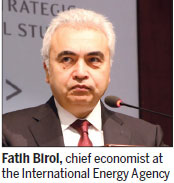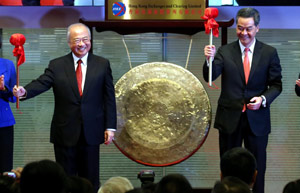China's nuclear power bid saluted
Updated: 2014-11-25 11:51
By Chen Weihua in Washington(China Daily USA)
|
||||||||
Goal to triple capacity by 2020 would make China No 3 in world
A senior official from the International Energy Agency (IEA) said China's ambitious plans to develop nuclear energy will carry important global implications.
The Energy Development Strategy Action Plan (2014-2020), published by China's State Council last Wednesday, set the goal to reach a nuclear power generating capacity of 58 GW by 2020, from the current 19.1 GW level. It would make China the number three country in terms of nuclear power generating capacity, following the US and France.
The plan also says that an additional 30 GW or more of new nuclear power generating capacity will be under construction in 2020.
Fatih Birol, chief economist at the IEA, said on Monday that half of the 80 GW of nuclear power capacity now under construction in the world is located in China.
According to the IEA, about 45 percent of the growth in nuclear generation by 2040 will come from China, while 30 percent will come from India, South Korea and Russia.
In a Monday talk on the IEA's report World Energy Outlook 2014, Birol praised the recent climate agreement reached by Chinese President Xi Jinping and US President Barack Obama. He said China's nuclear energy plan will be important in reducing the share of coal in its energy mix, as well as in reducing emissions of carbon dioxide.
He said if other countries don't change their policies, China will overtake the US with the largest nuclear power capacity in the coming decades.
"By building a lot of nuclear power plants and bringing the costs down, we may well see China soon as a serious competitor to Western countries in terms of exporting nuclear technology," Birol told the audience at the Center for Strategic and International Studies in Washington.
About 80 percent of the world's nuclear power plants are now located in OECD countries and 20 percent in non-OECD countries. Birol said in a matter of two decades, it will be 50 percent in OECD and 50 percent in non-OECD countries. He described it as very important for energy security, climate change and many other issues for the world.
Under the recent China-US climate deal reached during Obama's trip to Beijing, China will peak its carbon emissions by 2030 or sooner. China also pledged to increase clean energy sources to account for 20 percent of its total energy production by 2030.
The IEA report lists nuclear power as one of the few options available at scale to reduce carbon-dioxide emissions.
The Chinese government suspended the approval of new nuclear power projects and conducted a thorough review of its existing projects following the Fukushima accident in Japan in March 2011. But the pressure to reduce the reliance on carbon and fight the heavy pollution in Chinese cities has quickly put the nuclear plan back on track
China's energy action plan announced last week called for the timely launch of new nuclear power plants on the east coast and for feasibility studies of plant construction in inland areas.
According to the plan, efforts should be focused on promoting the use of large pressurized water reactors, high temperature gas-cooled reactors and fast reactors.
Birol listed financing and public concerns as the two major challenges in developing the nuclear energy sector.
He said governments which are serious about investing in nuclear plants must listen to the concerns of their people and try to address them.
According to the IEA, the world will face the retirement or decommission of some 200 nuclear power plants in the next two decades, most in the developed world, such as the US, Europe, Japan and Russia. He warned that most of these countries are not well prepared to tackle the challenge. To date worldwide, only about 10 nuclear power plants have been decommissioned.
Birol also expressed concerns over the growing amount of nuclear waste and called for a concerted effort to find a permanent solution to the challenge.
So far, no country has opened a permanent disposal facility to isolate the most long-lived and highly radioactive waste produced by commercial reactors, according to the IEA report.


(China Daily USA 11/25/2014 page1)

 Ferguson grand jury has reached decision
Ferguson grand jury has reached decision
 Top 7 affects of rate cut on people's life
Top 7 affects of rate cut on people's life
 42nd International Emmy Awards held in New York
42nd International Emmy Awards held in New York
 Forbidden City more welcoming
Forbidden City more welcoming
 Olympic champ Sun Yang failed doping test in May
Olympic champ Sun Yang failed doping test in May
 Top 10 kinds of foreigners in China
Top 10 kinds of foreigners in China
 Trending: Hangzhou man licks out painting
Trending: Hangzhou man licks out painting
 Rio 2016 mascots combine Brazilian fauna, flora
Rio 2016 mascots combine Brazilian fauna, flora
Most Viewed
Editor's Picks

|

|

|

|

|

|
Today's Top News
Hagel move won't affect China-US ties: experts
China's nuclear power bid saluted
No indictment of officer in fatal Missouri shooting
Chinese real estate stocks continue rise on rate cut
Women entrepreneurs get financial tips
Wealthy want kids to study abroad
Breast cancer study receives $1.5 million grant
SAT scores canceled for some test-takers in China, Korea
US Weekly

|

|







